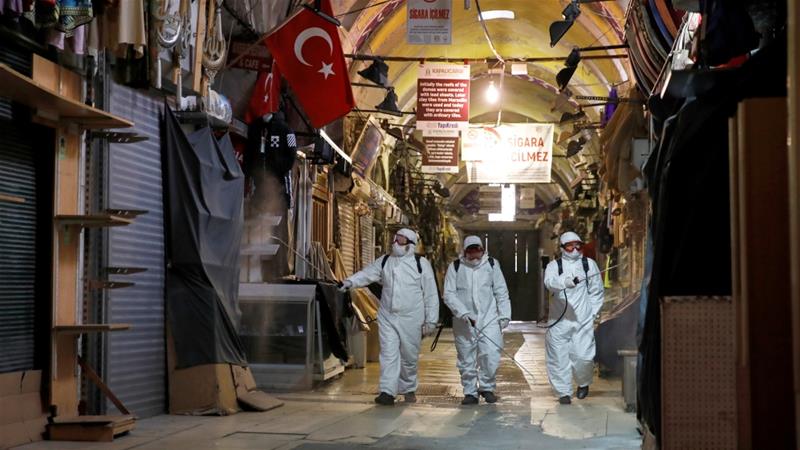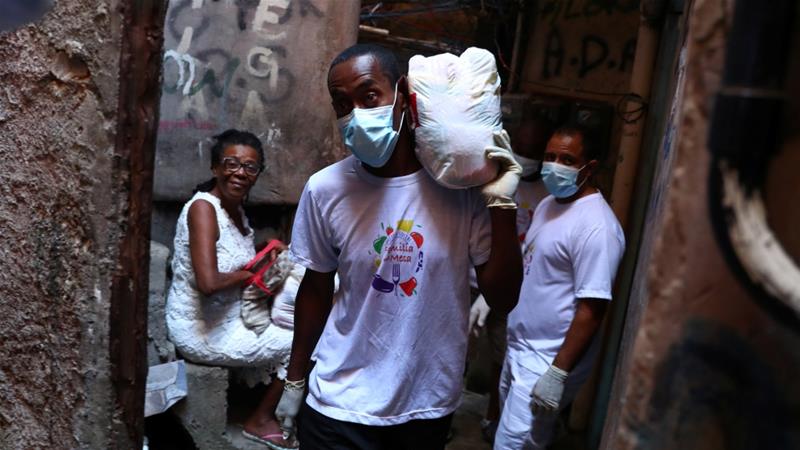Home » Middle East »
Why Turkey is facing a steep curve of new coronavirus cases
With more than 18,000 infections reported, Turkey surpasses other G20 nations that discovered the virus weeks earlier.
Ankara, Turkey – Since declaring its first coronavirus case three weeks ago, Turkey has recorded one of the steepest trajectories of new cases in the world, amid fears it could become a hot spot of the pandemic.
The rapid rise in cases – 18,135 confirmed infections and 356 deaths as of late Thursday – has seen Turkey overtake other G20 states such as South Korea and Canada that reported cases of the virus weeks earlier.
More:
-
Turkey: Lira at crisis levels as virus hits trade, factories
-
Turkey suspends all international flights, expands restrictions
-
Friday prayer at home for most but some risk infection at mosques
It has also left Turks asking if the country might be following the path of Italy, which has recorded more than 110,000 cases.
“Turkey has the highest acceleration rate for cases,” said Caghan Kizil, associate professor of neuroscience and genetics at the Helmholtz Association of German Research Centres.
“This is because social mobility wasn’t prevented. If we look at China, they were successful because they identified asymptomatic patients who weren’t showing signs of infection. After the lockdown in Wuhan, the number of cases caused by undocumented infected people dropped significantly.”
Esin Senol, a professor of infectious disease at Gazi University in Ankara, pointed out that Turkey has now seen the world’s tenth-highest number of cases and is one of the countries at most risk.
“It appears to have spread long before the first case was reported, due to trips to Europe, Iran and Umrah,” she said, referring to the Muslim pilgrimage to Saudi Arabia.
Limiting testing to those who had recently been abroad in the early days of the outbreak in Turkey also allowed the virus to spread, Senol added.
On Thursday evening, Minister of Health Fahrettin Koca announced 79 new deaths. Although the figure is far lower than numbers seen in the worst days in countries like Italy and Spain, where daily death tolls have frequently surpassed 800 recently, it was the sharpest increase yet in Turkey.
In a press conference on Wednesday, Koca revealed for the first time the nature of the spread of the outbreak across Turkey, showing that 60 percent of cases had been reported in Istanbul, the country’s commercial hub, which accounts for a fifth of Turkey’s population.
Mehmet Ceyhan, chairman of Turkey’s Infectious Diseases Association, warned that the country could see its number of infections outstrip others.
“If we go at the current rate, our number of cases will be 300,000 in 10 days,” he said.
However, closing down public spaces, restricting travel between cities and ensuring people stay at home would avoid such a dramatic scenario.
“I look at the measures that have been implemented, and our people have begun to adapt a little better,” Ceyhan said.
“If we comply with the measures in the same way, we may see a fall in the rate of increase.”
Shortages
Despite winning praise for its early adoption of restrictions such as border closures, suspending air travel and quarantining those aged over 65, the government has faced criticism over the relatively low number of tests carried out.
Turkey had conducted just under 107,000 tests and only reached a target of carrying out 10,000 a day on Monday.
This compares with more than half a million tests carried out in Italy.
Professional medical groups have highlighted a shortfall in the equipment, beds and health staff needed to deal with larger numbers of coronavirus patients.
“It is evident that hospitals in the city have not prepared adequately in the two and a half months since this deadly virus first came into the spotlight,” the Istanbul Chamber of Physicians said in a statement.
As well as a shortage of protective gear such as masks and gloves, the chamber also criticised a lack of organisation and improper testing of health workers, noting that more than 100 staff in Istanbul hospitals had tested positive.
According to the government, more than 600 healthcare personnel have been infected across Turkey.
“That’s worrying,” said Kizil. “The answer to the question of whether we will be like Italy will be determined by how ready our healthcare system is for the high number of cases that appear on the horizon.”
Calls for quarantine
Ankara has resisted calls for a full lockdown, with President Recep Tayyip Erdogan calling for businesses to stay open and keep the economy’s “wheels turning”.
However, the president said Turkey would step up measures if the outbreak continued spreading.
The government has urged people to stay at home; closed schools, cafes and bars; restricted domestic travel; halted international flights; and suspended sporting events and religious gatherings.
The presidency declined to comment on the efficiency of its measures, but Koca on Wednesday defended the government’s response and said the health ministry aimed to implement 30,000 tests daily within 10 days.
“We have done everything to create a fighting environment in unity and togetherness from the beginning,” he said.
“We plan to enhance our resources as much as possible and we are planning what to do in situations, such as plan B, plan C, plan D.”
Senol, the infectious disease specialist, called for more robust testing and isolation policies as well as greater transparency and information sharing.
Turkey should prevent people from mixing outside their homes, Kizil said.
“Turkey is doing the exact opposite of what must be done. This outbreak is in the late stages and we can’t be satisfied with early-stage measures like washing hands and practicing social distancing. We need quarantine.”
Inside Story
Are all coronavirus cases being reported?
Source: Read Full Article




